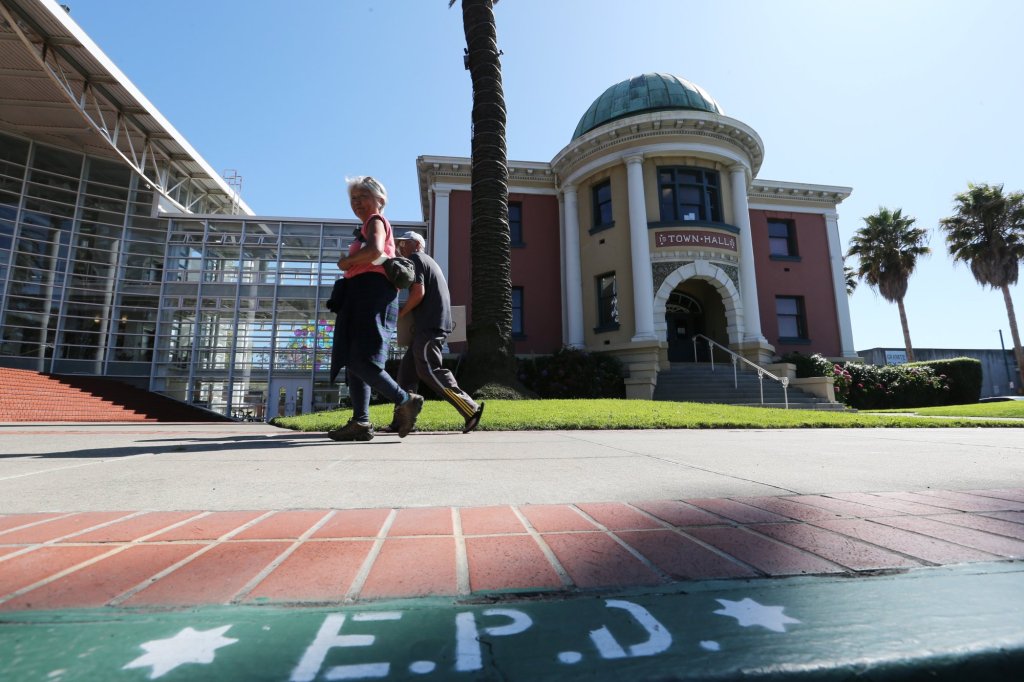Politics is a relatively low-paying gig, even in the high-priced Bay Area.
And the resulting brain drain at the City Council level is being felt acutely across the region — forcing changes in pay and time commitment in an effort to recruit new councilmembers and retain current ones. Civic pride doesn’t pay the bills.
In Emeryville, the City Council will start searching for a fifth member to appoint to its vacant seat, after Ally Medina abruptly announced her resignation in December. Her departure — sparked by the need to keep up with the Bay Area’s increasingly unaffordable cost of living — leaves a seat open for any resident to apply.
Medina was first elected to the Emeryville City Council in 2016 and was appointed to a second term in 2020 when no challengers sought the job.
In her announcement last month, the 33-year-old said she was stepping down from the position in part because she could not afford to turn down the opportunities — and better pay — offered by her new tech job, especially as she’s thinking more seriously about her future here.
“Politics is a low-paying career, especially at the beginning — I think that’s absolutely an endemic problem,” Medina said.
Emeryville councilmembers — who work part time — earn between $13,888 and $20,000 annually, depending on individual benefits, according to data from Transparent California.
In an interview Wednesday, Medina said she had previously been able to make ends meet while keeping the lower-paid position — rewarded by the work and projects she was able to tackle on the council. But that simply wasn’t sustainable forever, she said, especially considering the area’s cost of living. And she’s not sure there’s any one “magic solution” for a city to decide how much it can afford to pay its elected public servants.
“The routes of access are predetermined by how much money you can give up,” Medina said. “I don’t come from an economically advantaged background — I grew up with a single mother on food stamps — but I have still had the privilege of having come into office from a background in politics, and having a steady job where I said, ‘Hey, I’m elected,’ and they understood.”
Conversations about compensation can become even more complex in cities that have fewer residents — including Emeryville, with a population of 12,905 as of 2020 — since their pay is often dwarfed by what larger cities can afford to set aside in their budgets.
While Medina was able to make the job pencil out for six years, economics have increasingly been blamed for a brain drain in local governments — before and after elections.
In June, Greg Magofña, a renter and housing advocate, pulled out of the race for the Berkeley City Council because he said he was priced out of the city, leaving behind the tenants for whom he had hoped to fight. Even back in 2016, Palo Alto lost one of its Planning and Transportation commissioners because the town became “unaffordable even for an attorney and a software engineer.”
And a growing number of cities have begun increasing councilmembers’ paychecks as a result.
A majority of Berkeley voters approved a roughly 75% hike in councilmembers’ pay in 2020. Santa Rosa residents followed suit this year, nearly doubling members’ salaries. And the Alameda City Council will go from the lowest paid in the county to one of the highest, after voters agreed to cap salaries at $25,977.
Emeryville’s elected officials voted last year to max out the raises they were legally allowed to provide, and reduced local committee obligations to create a more reasonable workload.
When Ken Yeager was elected to the San Jose City Council in 2000, he had to keep his job teaching political science at San Jose State University to maintain his needed income.
Outside of major metropolitan areas like San Jose, Oakland or San Francisco, he said it was commonly understood that elected officials would pocket only a few hundred dollars each as compensation for their part-time work.
“In the old days, that was the philosophy: This is your contribution and part of your civic duty,” Yeager said. “It does seem different at the local level; the people running for the state Legislature or Congress are the politicos making a lot of money, but we somehow think that local government should be devoid of that.
“If more money is involved, maybe people will think candidates are running for other reasons.”
But in smaller cities with part-time elected officials, he wasn’t sure if finances are really to blame for who chooses to campaign, especially since other benefits like health care and pension plans are often on the table.
“How much does pay affect who runs, and do you get people who are better representative of a population? I’m not quite sure,” Yeager said. “If I had to make a recommendation that I think would be most beneficial, it would be for these councilmembers in smaller cities to have staff that can help read reports, go to events and work with constituents.”
Reflecting on Medina’s years in office, her former colleagues lauded her work in environmental sustainability and focus on the intersectionality of transit equity and housing affordability.
“When people think of Emeryville, they see a leading city that has still a lot of work to do, but I think a lot of the groundwork that’s been laid out before us has been paved by former Councilmember Medina,” Councilmember David Mourra said during Tuesday’s council meeting.
In Emeryville, City Hall staff must fill the unexpected vacancy by March 16.
According to City Clerk April Richardson, prospective applicants will have 15 days to submit a written statement about their experience and desire to be appointed between Jan. 27 and Feb. 10.
The four-member council voted against holding a special election because of the price and timing; the city would have to wait until early November to hold an election, which the Alameda County Registrar of Voters estimated would cost between roughly $138,000 and $153,000.
Mayor John Bauters gave a nod to the financial considerations, but he ultimately pointed to California’s government code that specifically requires at least five councilmembers be involved in a city’s decision-making process.
Brian Donahue, a local blogger and the sole public commenter throughout Tuesday’s meeting, asked the council to choose a special election over an appointment.
“I implore you, don’t go down that path — we need to have democracy and we need the people’s choice, not Mr. Bauer’s choice, which is what it will be,” Donahue said. “Sure, (a special election) is going to cost a lot of money, but we’re correct to blame Ally Medina for doing this to us and to direct public anger at people who have a cavalier attitude about the City Council job.”










